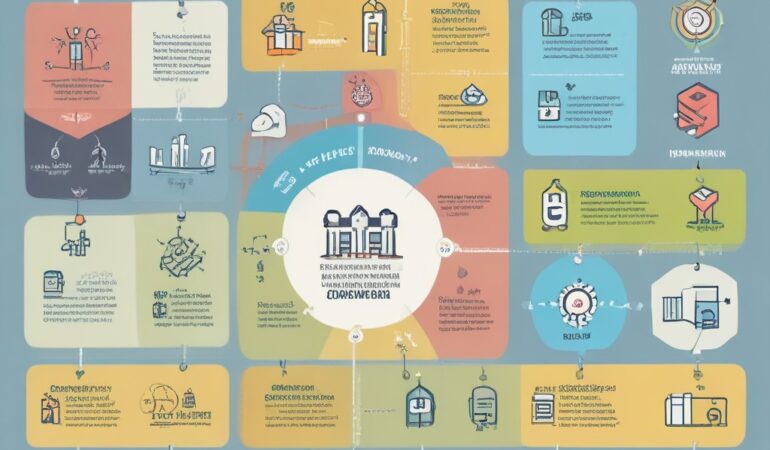Why Pursuing a Course in HR Management is a Smart Career Move
Introduction: Human Resources (HR) is the backbone of any successful organization, playing a key role in managing talent, driving company culture, and ensuring smooth business operations. As businesses continue to grow and evolve, the demand for skilled HR professionals has skyrocketed. If you’re looking to embark on a rewarding career or advance your current role in HR, enrolling in a course in HR management could be the next step to success.
In this blog post, we’ll explore the benefits of taking an HR management course, the skills you’ll gain, and how it can impact your career trajectory.
Why Choose a Course in HR Management?
Develop In-Demand Skills HR management isn’t just about handling recruitment; it encompasses employee relations, performance management, organizational behavior, compliance, and strategic planning. A dedicated course will provide you with a comprehensive skill set that prepares you to address these varied challenges with confidence.
Career Growth & Opportunities With businesses placing increasing importance on people management, HR professionals are in high demand. A specialized course in HR management will boost your resume and make you stand out in a competitive job market. Whether you’re looking to land a job as an HR officer, manager, or director, the qualification will open doors to leadership positions in HR.
Stay Updated with Industry Trends HR is a constantly evolving field with new laws, technologies, and trends emerging regularly. A course ensures that you stay up to date with the latest best practices and legal compliance. You’ll learn how to implement cutting-edge HR solutions and adapt to changes like remote work, digital tools for HR management, and diversity and inclusion initiatives.
Learn Strategic HR Management A comprehensive HR management course goes beyond administrative tasks and teaches you how to align HR strategies with organizational goals. You’ll understand how to improve productivity, foster employee engagement, and create policies that contribute to the overall success of the business.
Skills Gained from an HR Management Course
Recruitment & Selection: Learn how to attract, interview, and hire top talent that fits your organization’s culture.
Performance Management: Gain insights into setting clear goals, providing constructive feedback, and assessing employee performance effectively.
Employee Relations: Develop the skills to resolve conflicts, improve communication, and create a positive work environment.
Training & Development: Learn how to create and implement training programs that foster employee growth and improve company performance.
Legal & Ethical Compliance: Understand the laws surrounding employee rights, contracts, and workplace safety to ensure your company is always in compliance.
Types of HR Management Courses
Certificate Programs Ideal for those looking to gain specific HR skills or for professionals who want to transition into HR roles. These courses typically take a few months to complete.
Diploma & Degree Courses For those who want a deeper and more comprehensive understanding of HR, a diploma or degree can provide both theoretical knowledge and practical experience. These are often longer, taking one or two years to complete.
Online Courses & Webinars If you’re looking for flexibility, many online platforms offer HR management courses. These allow you to learn at your own pace and often come with certifications upon completion.
How a Course in HR Management Can Enhance Your Career
Leadership Development HR professionals often take on leadership roles, whether in HR teams or across the organization. A solid HR management course can help develop your leadership capabilities, teaching you how to manage teams effectively and become a trusted advisor to senior management.
Global Job Opportunities HR is a universal field that exists in every country, and many global organizations require HR managers to understand international regulations, workforce trends, and cross-cultural challenges. A strong foundation in HR management can lead to opportunities to work with multinational companies or even abroad.
Competitive Salary Potential HR professionals, especially those with strong educational backgrounds and advanced certifications, often command competitive salaries. The skills learned in an HR management course will make you eligible for high-paying roles within HR departments.Introduction: Human Resources (HR) is the backbone of any successful organization, playing a key role in managing talent, driving company culture, and ensuring smooth business operations. As businesses continue to grow and evolve, the demand for skilled HR professionals has skyrocketed. If you’re looking to embark on a rewarding career or advance your current role in HR, enrolling in a course in HR management could be the next step to success.
In this blog post, we’ll explore the benefits of taking an HR management course, the skills you’ll gain, and how it can impact your career trajectory.
Why Choose a Course in HR Management?
Develop In-Demand Skills HR management isn’t just about handling recruitment; it encompasses employee relations, performance management, organizational behavior, compliance, and strategic planning. A dedicated course will provide you with a comprehensive skill set that prepares you to address these varied challenges with confidence.
Career Growth & Opportunities With businesses placing increasing importance on people management, HR professionals are in high demand. A specialized course in HR management will boost your resume and make you stand out in a competitive job market. Whether you’re looking to land a job as an HR officer, manager, or director, the qualification will open doors to leadership positions in HR.
Stay Updated with Industry Trends HR is a constantly evolving field with new laws, technologies, and trends emerging regularly. A course ensures that you stay up to date with the latest best practices and legal compliance. You’ll learn how to implement cutting-edge HR solutions and adapt to changes like remote work, digital tools for HR management, and diversity and inclusion initiatives.
Learn Strategic HR Management A comprehensive HR management course goes beyond administrative tasks and teaches you how to align HR strategies with organizational goals. You’ll understand how to improve productivity, foster employee engagement, and create policies that contribute to the overall success of the business.
Skills Gained from an HR Management Course
Recruitment & Selection: Learn how to attract, interview, and hire top talent that fits your organization’s culture.
Performance Management: Gain insights into setting clear goals, providing constructive feedback, and assessing employee performance effectively.
Employee Relations: Develop the skills to resolve conflicts, improve communication, and create a positive work environment.
Training & Development: Learn how to create and implement training programs that foster employee growth and improve company performance.
Legal & Ethical Compliance: Understand the laws surrounding employee rights, contracts, and workplace safety to ensure your company is always in compliance.
Types of HR Management Courses
Certificate Programs Ideal for those looking to gain specific HR skills or for professionals who want to transition into HR roles. These courses typically take a few months to complete.
Diploma & Degree Courses For those who want a deeper and more comprehensive understanding of HR, a diploma or degree can provide both theoretical knowledge and practical experience. These are often longer, taking one or two years to complete.
Online Courses & Webinars If you’re looking for flexibility, many online platforms offer HR management courses. These allow you to learn at your own pace and often come with certifications upon completion.
How a Course in HR Management Can Enhance Your Career
Leadership Development HR professionals often take on leadership roles, whether in HR teams or across the organization. A solid HR management course can help develop your leadership capabilities, teaching you how to manage teams effectively and become a trusted advisor to senior management.
Global Job Opportunities HR is a universal field that exists in every country, and many global organizations require HR managers to understand international regulations, workforce trends, and cross-cultural challenges. A strong foundation in HR management can lead to opportunities to work with multinational companies or even abroad.
Competitive Salary Potential HR professionals, especially those with strong educational backgrounds and advanced certifications, often command competitive salaries. The skills learned in an HR management course will make you eligible for high-paying roles within HR departments.





